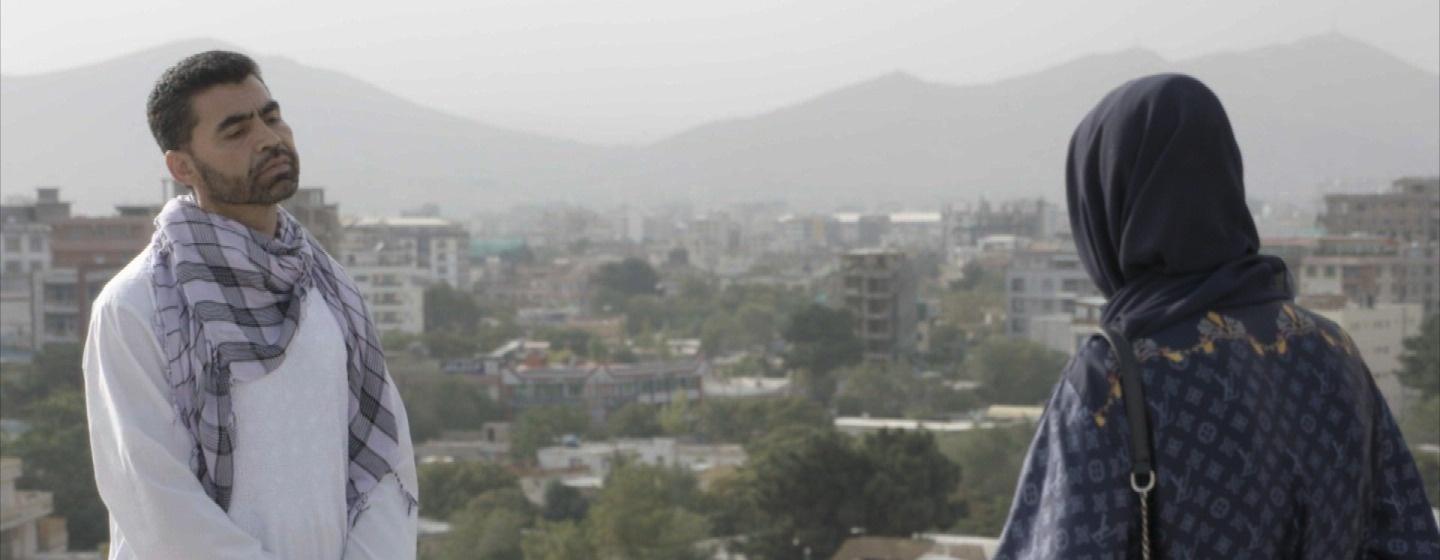Shortly after the withdrawal of American forces from Afghanistan, journalist Najibullah Quraishi sat down to interview a young woman at a restaurant in Kabul for the FRONTLINE film “Taliban Takeover.”
A man, apparently working undercover for the Taliban, soon approached and demanded that Quraishi stop filming.
“Cut your camera. Hey! Are you aware that under the Emirate it is forbidden?,” the man said, speaking Dari.
The next day the woman, identified in the film as Nargis, met the journalist in a less public place outside the capital city where she spoke openly about life under the Taliban.
“We can’t work,” said Nargis, a student and a model, speaking Dari. “We are not even allowed to university. Every day the situation is getting worse. For example, a few days ago, Taliban soldiers arrived in Kabul. Then their intelligence and vice and virtue branches arrived, which is really scary for us. Wherever we go, even if one strand of our hair is visible, they say it is against Islam.”
Nargis is one of various Afghans who agreed to speak candidly on camera for FRONTLINE in the days and weeks surrounding the Taliban’s return to power in August 2021. These interviews provide a compelling glimpse of life in Afghanistan in the immediate aftermath of the United States’ two-decade war and the sudden collapse of the Afghan government.
Still, while FRONTLINE obtained verbal consent—and in many cases signed releases—from these interviewees, producers proceeded cautiously. As filming occurred, the situation was volatile, and there was uncertainty about how the Taliban would rule and treat women. Later, as the film was about to air in October, FRONTLINE decided to go back to Nargis and other interviewees to ask whether they were still comfortable appearing on camera.
“The circumstances on the ground had changed so much,” FRONTLINE Executive Producer Raney Aronson-Rath said in explaining the decision.
This careful approach, for a film where newsgathering was already extremely difficult, exemplifies sound ethical decision-making and the importance of treating sources with respect and dignity.
The PBS Editorial Standards state that “producers must adhere to the highest professional standards of conduct.” And the Society of Professional Journalists’ Code of Ethics states that journalists should “Balance the public’s need for information against potential harm or discomfort.”
Following up with subjects who previously agreed to appear on camera is an unusual, but occasionally critical, step. In many situations, such an approach is unnecessary and could even discourage subjects from participating in a film. But when evolving circumstances in the world mean those subjects are at risk of significant harm due to their participation, producers should carefully balance the public’s right to know with the importance of ensuring that their subjects are fully aware of the dangers and have had the opportunity to provide informed consent.
Outside of public media, for example, a critically-acclaimed documentary about the rescue of Yazidi women and girls who had been abducted and sexually abused by ISIS was criticized after several survivors featured in the film told the New York Times that they did not understand how the footage would be used or where it would be shown, raising questions about whether they had given informed consent.
In this case, with people’s lives potentially at risk, FRONTLINE wanted to be certain the film’s subjects had carefully considered the consequences of their appearances.
“We were definitely cognizant of the stress many of the film subjects were under, especially the women, and that was in part why we went back to them to reconfirm they had considered the risks,” Aronson-Rath said. “But we also recognized that they had to make their own choice on sharing their story.”
Helpfully, she noted, many of the individuals were already publicly outspoken about women’s rights, and this “was a fight, a cause they were taking on in their own country, for their own futures.”
Indeed, one of the women in the film, Mahbouba Seraj, is a prominent advocate for women’s rights in Afghanistan. Rather than hide or flee, she insisted that she wanted to stay and directly engage with the Taliban. “Because the women, the 18 million women of Afghanistan are not dead, and the 18 million women of Afghanistan, they really need a voice,” she said in the film. “And I will be that for as long as I can.”
FRONTLINE’s senior editorial team, including managing editor Andrew Metz and senior editor Lauren Ezell, worked with their co-producing colleagues at the BBC to reach out to the film’s other subjects in the week before the film aired. Most communications occurred by audio and text using the mobile messaging service WhatsApp. In another case, a local producer on the ground was enlisted to find someone and then spoke to that person by phone.
One of the subjects who initially agreed to speak on camera expressed some hesitation when she was approached a second time. In response, producers told her that they could blur her face. Later that day, she got back in touch and said she was comfortable appearing on camera.
Even then, producers showed restraint and prioritized informed consent.
“We then asked her to sleep on it,” Aronson-Rath said, “and the next day she reaffirmed that she wanted to be included in the film.”
Contact Standards & Practices at standards@pbs.org.



